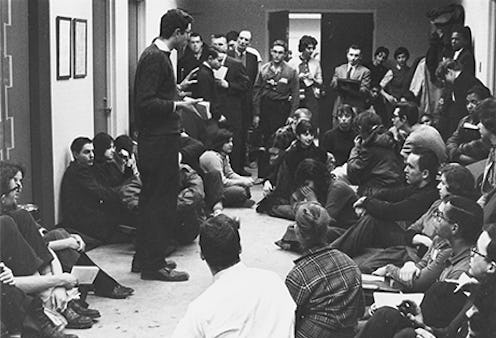
It's no secret that Bernie Sanders is supported by an army of millennials, among portions of other demographics. Considering how easy it is for people to relate to a young Bernie, this isn't surprising: Sanders was born in 1941, decades before swaths of his supports, yet his personal history is applicable to the many feelings and activist desires experienced by students today. His fans aren't shy about expressing their support, whether on social media or IRL, and they've been employing hashtags such as #FeelingTheBern, #BernieBro, and #BabesForBernie — not mention, they're rocking some amazing “Bernie Is Bae” T-shirts.
In an interview with TIME Magazine this past May, Sanders refrained from basing his campaign on his family narrative or even his personal one for that matter. When it comes to politics, Sanders is cut and dry.
Too much of media looks at politics as a soap opera ... I have my views, Ted Cruz has his views, that’s fine: let’s lay them out and let the American people decide.
While Sanders’ statements in the present day are admirable, we shouldn't forget about his vibrantly political youth. His own journey as a 20-something activist provides some serious leverage when it comes to garnering the millennial vote.
Here are four facts about young Bernie Sanders that help explain why so many millennials are on board with the self-proclaimed democratic socialist...
Sanders Was a Serious Student Activist
Being able to claim a stake in Chicago’s civil rights history is a pretty big deal. As a college student at the University of Chicago, Bernie Sanders protested the school’s segregated housing policy. According to TIME Magazine, the 20-year-old planted himself on the steps of the administration building and demanded social progress. "We feel it is an intolerable situation, when Negro and white students of the university cannot live together in university owned apartments," he insisted.
According to TIME Magazine, the protest was foregrounded by other major efforts. Sanders also led the Congress of Racial Equality, an affiliate of the NAACP, and protested against police brutality. And like so many students, who take to both speech and writing to express their ideas, Sanders also edited the Liberty Union Party newsletter Movement.
His history even shares eerie similarities with those who have been arrested for civil disobedience in recent protests against racial discrimination and police brutality. Politico reports he was arrested in 1963 for protesting against Chicago’s segregated schools. The close comparisons show that although decades have passed, the same issues are present in different forms. Like Sanders, students exercise civil disobedience to further racial equality in movements such as Black Lives Matter and the even more recent strikes at the University of Missouri.
He Always Included the Younger Generation
In an interview with Politico, Liberty Union Party member Judith Sargent, who joined Sanders in the labor-backed and anti-war party active during the seventies, reminisces on Sander’s inclusiveness.
He was unusual for a political activist at that point because he was willing to include not only women but children …
Sanders used to bring his son to these meetings, creating a casual yet accepting atmosphere. The same article quotes another Party member John Bloch, who said, "Hell, I think I had my kids there, too. We were not terribly formal back then."
Student leaders who make sure to schedule meetings at convenient times and promise pizza can understand the importance of maintaining an informal atmosphere where members, no matter who they are, feel welcome to voice their opinions.
He Was a Wiley Student
Everyone loves a rebel. According to TIME Magazine, the University of Chicago’s dean asked Sanders to take a year off of school, because he was “sloppy.” If he was sloppy, I'm guessing it was only because he had dedicated his time to taking action on political matters. Like involved students already know, you learn just as much outside of the classroom.
He Had to Convince Himself He Wasn’t Crazy
After building a life with his wife and seeing it fail, Sanders was back to square one. Mother Jones reports that he divorced his wife, with whom he had had a son; lost four elections; and was subsequently kicked out of his apartment for not paying the bills. Soon after, Sanders moved into his friend Richard Sugarman’s apartment (at least it was better than his parents’ basement, right?).
To millennials' dismay, success upon graduating is not a linear path, which oftentimes leads us to question our aspirations. Sugarman said that after waking up many mornings, Sanders would audibly ensure himself, “We’re. Not. Crazy.” Sometimes talking to yourself is the only way to maintain sanity. Everyone's been there, done that.